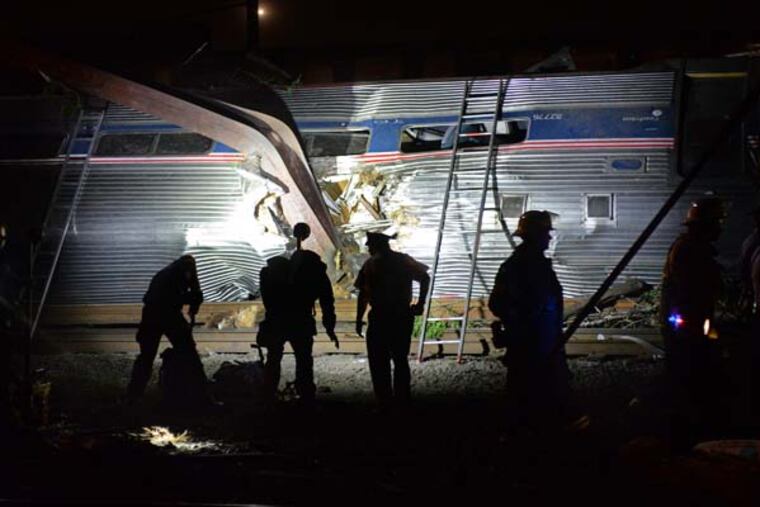Amtrak settles train crash claims for $265 million
In one of the largest rail crash settlements in U.S. history, federal district Judge Legrome Davis Thursday signed off on a $265 million payout by Amtrak for the 2015 derailment in Philadelphia of passenger train 188 that claimed eight lives and injured more than 200.

In one of the largest rail crash settlements in U.S. history, federal district Judge Legrome Davis Thursday signed off on a $265 million payout by Amtrak for the 2015 derailment in Philadelphia of passenger train 188 that claimed eight lives and injured more than 200.
Both Amtrak and lawyers for scores of plaintiffs approved the settlement, which came in quickly for a case of this magnitude. The settlement also came in below the federal cap of $295 million on payouts for Amtrak crashes.
The order calls for the appointment of two special masters who will evaluate claims and decide on payouts.
Under the order, injured Amtrak passengers and family members who participate in the settlement program will receive a final number by June 30, 2017, said Thomas Kline, who chaired the committee of plaintiffs' lawyers that hammered out the agreement with Amtrak. They will receive their payments in August.
Injured parties who choose not to participate can still sue Amtrak. But Kline said he expects the vast majority of claims to be settled.
"We believe we will have 100 percent, or near 100 percent participation," Kline said.
Amtrak declined to comment on the settlement.
The New York bound train derailed on the Frankford Junction curve in Port Richmond section of the city shortly after it left 30th Street Station on the evening of May 12, 2015.
That section of the track had a posted speed limit of 50 miles per hour but the train was traveling at more than twice that - 106 miles per hour - as it entered the curve.
The National Transportation Safety Board later determined that the engineer, Brandon Bostian, lost track of where he was, likely because he became distracted by radio reports of a nearby SEPTA train being struck by rocks.
From the outset, Amtrak admitted liability. In fact, the rail line has already begun settling smaller claims and paying medical expenses.
But, even with Amtrak conceding responsibility, there were other hurdles in the path of a legal resolution. Initially, payouts on Amtrak rail crashes were limited by law to $200 million per incident. And in at least one prior rail disaster - the crash of a commuter rail train in Chatsworth, California in 2008 that claimed 30 lives and injured 100 - the cap severely limited compensation for grieviously injured passengers, lawyers said.
Congress raised the cap to $295 million following the crash in Philadelphia. But lawyers still had to craft a settlement process for weighing claims evenhandedly and at arms length.
Kline and fellow plaintiffs lawyer Robert Mongeluzzi say the settlement achieves that by establishing special masters who will assign a dollar value to each claim, quite apart from the amount of money in the fund.
If total claims exceed the $265 million Amtrak payout, each claim will be decreased proportionately. If in the unlikely event awards are less than the Amtrak payout, each claim will be increased, they said. Attorneys fees were not disclosed in the order and are subject to private agreements between the lawyers and their clients.
David Cook, a lawyer at the New York plaintiffs firm of Kreindler & Kreindler, which specializes in mass disaster litigation, said the Amtrak payout is one of the largest ever in a passenger rail crash.
"It's certainly up there," said Cook, who is representing several plaintiffs in the Amtrak crash.
Both Kline and Mongeluzzi said the settlement was reached with unusual speed.
"This outcome is historic, not only because of the result, but because of the relatively short period of time - from inception of litigation to reaching this agreement - and actual compensation to the victims," Mongeluzzi said.
215-854-5957 @cmondics